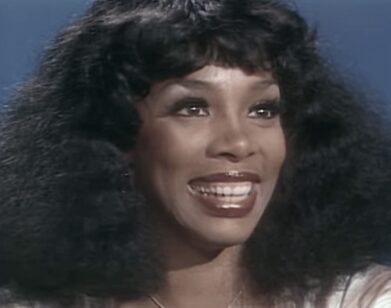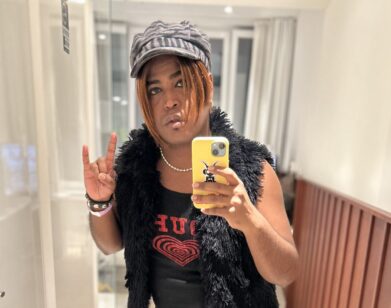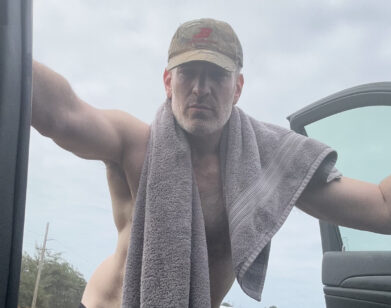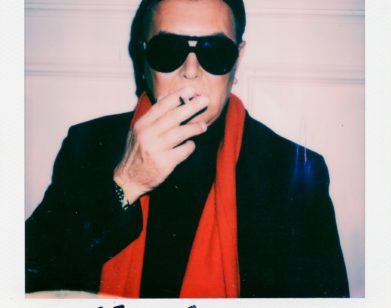Rami Malek Says “Hello, Friend” to His Mr. Robot Composer Mac Quayle
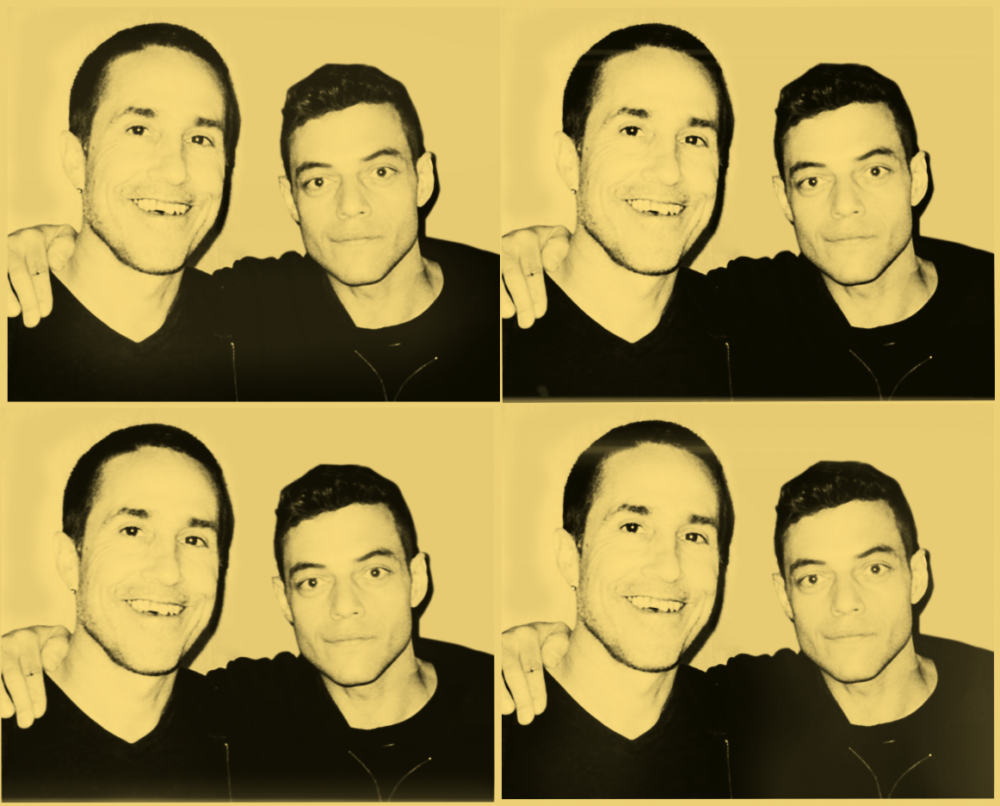
When Mr. Robot premiered on the USA network in 2015, Rami Malek—having yet to take home an Oscar for transforming into Freddie Mercury—was still known to the world as the Pharoah Ahkmenrah in Night at the Museum, or, for Twilightheads, the Egyptian coven member Benjamin, in Breaking Dawn Part 2. In the show—now in its fourth and final season—Malek takes Elliot Anderson, a socially anxious computer hacker with a plan to dismantle a corporate monolith, and elevates him to levels of mastery, his voice growly, his eyes bulging in the glow of the screen.
But behind Malek (and the rest of the cast, which includes Christian Slater as a torturous anarchist alter ego) lies perhaps the show’s real virus, that which allows it to subtly hack your brain until you hear the voice of Malek whispering “Hello, friend” in your slumber: the music. A slow-creeping symphony of synthesizers that even Malek admits makes his heart race, the original score to Mr. Robot is composed by Mac Quayle, an industry veteran who has also produced soundtracks for many of the shows in the Ryan Murphy universe, including American Horror Story, Pose, and The Politician. On top of scoring television and films like Spring Breakers, Quayle is largely responsible for the danceability factor of hits (and remixes) by Whitney Houston, Madonna, and Donna Summer, who once brought him chocolate chip cookies in the studio. On a recent Tuesday evening, Malek called up his composer, who took him from his first synthesizers to the Mr. Robot studio, and back again. —SARAH NECHAMKIN
———
RAMI MALEK: How you been, Mac?
MAC QUAYLE: I’ve been good. I’ve been working really hard on season four of Mr. Robot. We’re in full post-production mode right now.
MALEK: Oh, I can imagine. You have to let me in one of those days. If there’s any time you don’t mind having a straggler around, I’d love to join you.
QUAYLE: It would be great to have you here. It would be a little weird because I’m used to just watching you on the screen all day, but it’d be fun.
MALEK: This is your final season of scoring Mr. Robot. How does that make you feel?
QUAYLE: I’m excited, but it’s also quite sad to say goodbye.
MALEK: I am just a fanboy of yours and look forward to hearing for the first time mostly, as it airs, what you’ve done and the magical musical composition that comes from your mind and your fingertips. What’s been the most enjoyable experience of it for you?
QUAYLE: Well, that’s very kind. And it’s good for me to know that I can help put you at ease if there’s ever a trouble spot you feel like the music is going to cover up. Of course, I never see those trouble spots, I just see this amazing performance that inspires me to do what I do, and it’s a collaboration of sorts between you and me.
MALEK: Ah, well, you’re a very kind man, and I’m wondering if any of that stems from being a choir boy.
QUAYLE: Nice segue. That was my first foray into music. My parents, when I was six, just took me to church, put me in the church choir. No discussion, no warning. My musical education began right then. And many decades later, it’s still going strong.
MALEK: And when were you first introduced to synthesizers?
QUAYLE: That happened when I was 15. There was a keyboardist in a local band in Virginia where I grew up and he invited me to check out his keyboard rig. And there were two synthesizers that I had never heard of, of course, because I had never really seen a synthesizer. And he played them for me, he let me play them, and essentially set my life on a course from that day forward which I pretty much haven’t deviated from. It’s almost a little scary because it was that powerful of a day.
MALEK: Do you have them?
QUAYLE: I don’t.
MALEK: Who owns them? How do we get a hold of them?
QUAYLE: I wonder if he even still owns them. It was a Yamaha CS-80. They turn up occasionally for sale, but they’re very rare. The other one was rare but not as rare, the Korg MS-20. It does seem like at some point I should own them, now that you mention it, just to connect it to the beginning.
MALEK: To anyone reading this, if you’re out there and you have one or both of these two pieces of equipment, Mac and I are reaching out to you. This would bring it full circle for Mr. Quayle.
QUAYLE: Indeed.
MALEK: Do you listen to anything in particular to inspire you to compose with synth or any other traditional types of composition?
QUAYLE: Well, I do listen to all kinds of music. From way back, one of the first artistic musical pioneers that I was turned onto, probably around that same time when I saw those synthesizers, is Brian Eno. And he certainly has electronic sound as part of his music. And then, of course, I get a lot from watching other shows and films and listening to soundtracks.
MALEK: Things from a certain period, or soundtracks from shows and films that are current?
QUAYLE: Spanning the decades. One that comes to mind is A Clockwork Orange. I know that’s also a touchstone for Sam [Esmail]. Sam is a big Kubrick fan.
MALEK: Well, you just gave me my plans for the night. I’m going to listen to A Clockwork Orange‘s soundtrack and see how that inspires me. And what have you been listening to lately?
QUAYLE: I can’t say I’ve been really listening, because I’ve been just locked in the studio working. But when I have a little time and I just want to put on something in the background, there’s this internet radio station I’ve been listening to for probably 20 years now that’s called Secret Agent, part of the SomaFM group of internet radio stations. It’s this fantastic mix of cinematic, electronic, and like spy music from the ’60s, just amazingly curated. I can put that on and let it run for hours.
MALEK: Well, I’m now going to ask you for your hit list one of these days, maybe even by the end of this interview. We’ll have to add Mac Quayle’s top 10 to the final credits of the interview.
QUAYLE: Okay.
MALEK: So I know how you feel about working with Sam Esmail, of course. I know you get to work with another prolific filmmaker in Ryan Murphy. I heard that with every season of American Horror Story that you come up with a different theme for the music. What can you tell me about that? Is that even true?
QUAYLE: Oh, it’s true. Every season is a completely different story, different characters, maybe a different time period. So it’s like starting a new show and the only common thread is that it’s a very twisted flavor of horror every season. And so we’ve got to scare people, we’ve got to creep them out, we’ve got to take them on a mind-bending journey through whatever story they’ve cooked up. That stays the same every season, but we do it in a different way each time.
MALEK: I can imagine that’s daunting, but very challenging and rewarding in the same right.
QUAYLE: It is, every season. Now I’m on my sixth season and that initial period of coming up with the sound and scoring the first episode is daunting. Each season, I get a little more confidence knowing that I started with a blank page a number of times before, and it always ends up getting filled. Once that first episode is done and Ryan is happy and we’re all happy, it’s a real feeling of accomplishment.
MALEK: And how long does it take for Ryan to be happy? How about this: Who’s easier to please, Sam or Ryan? You don’t have to answer this question. I would hate if someone asked me this question.
QUAYLE: They’re just different. They’re both artists with their own unique vision and they have a different way of getting to the achievement of the vision. It’s an interesting mixture for me to get to go back and forth between the two.
MALEK: There are so many good death scenes in the shows you’ve worked on, so I wanted to know how you decide to score a death scene, and what you think is the most important element.
QUAYLE: Yes, there’s a lot of death scenes. A lot of these shows that I work on, they’re a bit dark, there’s death. And so what kind of death is it? That’s where the approach to scoring it begins. I suppose yes, from a human viewpoint, every death is sad. However, in the context of the various plots and stories, that’s not always the emotion. Sometimes it’s a horrendous death, some crazy, mutilated murder. Other times, it is a sad death with someone there feeling very sad at the person dying. I guess I haven’t seen anything that you’ve been in where you died. Maybe there’s been something that you’ve done where you were killed that I haven’t seen. But everything else I’ve seen that you’ve done, you haven’t died yet. So how would you approach it?
MALEK: I don’t know, that sounds like a trick question, man. Between all of these shows that you work on, is there one character that you identify with the most? I imagine some of them can’t help but seep their way under your skin at some point.
QUAYLE: Well, they can for sure. And it’s not just because we are having this conversation, but I definitely identify with Elliot. I share the worldview that he has. I’m a little better now, but definitely the sort of social anxiety of being uncomfortable around people, I’ve struggled with that. And I think that you could say being a composer in a way is like being a hacker. We hack into the audience’s subconscious and affect how they feel and they don’t even know it. So yeah, I kind of relate to Elliot.
MALEK: Well, I can relate to you immensely. And I know you’ve had the chance to work with a number of iconic artists that are cross-generational. Let’s see, I know we have Donna Summer there.
QUAYLE: We produced a song for her and she came to my studio and recorded the vocals. She was a very nice lady and an amazing singer and it was a pretty special experience to get to work with her like that. In fact, I think she baked chocolate chip cookies and brought them to us, which was very nice. She was awesome.
MALEK: Who else is on this phenomenal list? Whitney Houston?
QUAYLE: I worked on a number of remixes for Whitney, but not in the studio with her. However, there was one remix and the record label really wanted to do it, but remixes don’t always work. You can’t always take somebody’s vocal recording and make a dance record out of it. That was the case on this one, and the record label convinced her to re-sing her vocals for the remix. But she was on tour in Europe and we were in New York, so she went into a studio in Germany and we went into a studio in Manhattan. And we did a digital link and produced a vocal session with her re-recording these vocals for the song. So that was as close as I got to Whitney.
MALEK: Oh, what a rare opportunity. Who of all the artists you’ve worked with has been the easiest to remix? Whose music lends itself to be easily remixed?
QUAYLE: Well, certainly things that are already dance music, that stuff’s pretty easy. Perhaps more of note is something that is more difficult because it’s not dance music, and then you take it and you turn it into something that is an anthem on the dance floor. We did a bunch of remixes for this fantastic artist, Deborah Cox, and she would do these epic power ballads, very far away from dance music. But the tempo of the song was such that if you doubled up the beat underneath, it was kind of right there at the tempo for house music. And her vocal performance was so strong that it just became this anthem in the club. It just felt natural. It didn’t feel like it had been a ballad. It felt like it was a dance record even though it was 180 degrees away from that to begin with.
MALEK: And what is the feeling or sensation when you discover that in the moment? That moment where you doubled up the time on something and it clicked, and you were off to the races?
QUAYLE: I think you jump up out of the chair, your hands are in the air, you turn it up really loud and you have a little dance. And now you know you got something good.
MALEK: Next time you need to videotape this for us so we can watch at home and enjoy your celebration with you.
QUAYLE: Okay, no problem.
MALEK: No, no, we’ll let you dance like nobody’s watching and enjoy that celebratory moment. Take me from there, going from the music biz and into the film industry working as a composer in music. Is there something that you prefer doing, or is this something you will continue to interchange throughout the course of your life?
QUAYLE: I think there’s definitely some more music for music’s sake rather than something scored to picture in my future. Recently, it’s been all about just scoring TV shows, but I do enjoy writing songs. Who knows? Maybe there’ll be another remix someday.
MALEK: It does give you the opportunity to play ping pong with Peter Gabriel every once in a while. How did that happen?
QUAYLE: Peter is one of those inspirational artists that I’ve listened to forever. He owns this amazing recording studio facility out in the countryside in England called Real World. And it’s an amazing place to record and an amazing place to stay. It’s kind of like a bed and breakfast that has a recording facility. And I was there working with New Order, the seminal band from Manchester.
They had a ping pong table, I like to play, and I walk out to the ping pong area and there’s Peter and two, three other people. They say, “Hey, do you want to play some doubles?” I had never heard of playing doubles with ping pong. I promptly agreed and then was terrible, so it was kind of exciting but also really embarrassing because that was the beginning and end of my doubles ping pong career.
MALEK: Well, we’ve got ping pong with Peter and cookies with Donna and all the accolades you tremendously deserve for your career. I listen to all of your soundtracks whenever there’s an opportunity to get my heart racing, so thank you for that. I think every person that comes into contact with you, whether it’s through your work or as a human being, knows how talented and gifted and kind you are. So I appreciate us getting the chance to share that with whomever gets lucky to know you through this.
QUAYLE: That’s very kind. Do you remember we had this interesting moment of synchronicity when we very first met? It was 2015, the pilot episode of Mr. Robot was just about to have its premiere at South by Southwest. Nobody knew anything about the show. I came to Austin to come to the premiere and I was walking across some path outside the convention center. And on another path that was going to intersect my path, I saw a pedicab…ringing any bells?
MALEK: Yes, keep going.
QUAYLE: And as I got closer, we were on a course to intersect right at where the two paths meet. And I look, and in the pedicab was you and Portia [Doubleday] and Carly [Chaikin]. And I said, “Mr. Robot!” and the three of you looked at me like, “How does he know who Mr. Robot is?” And I said, “I’m your composer!” It was kind of a fun little accident.
MALEK: Oh, it was a beautiful moment of serendipity. We’ve come a long way, Mac.


